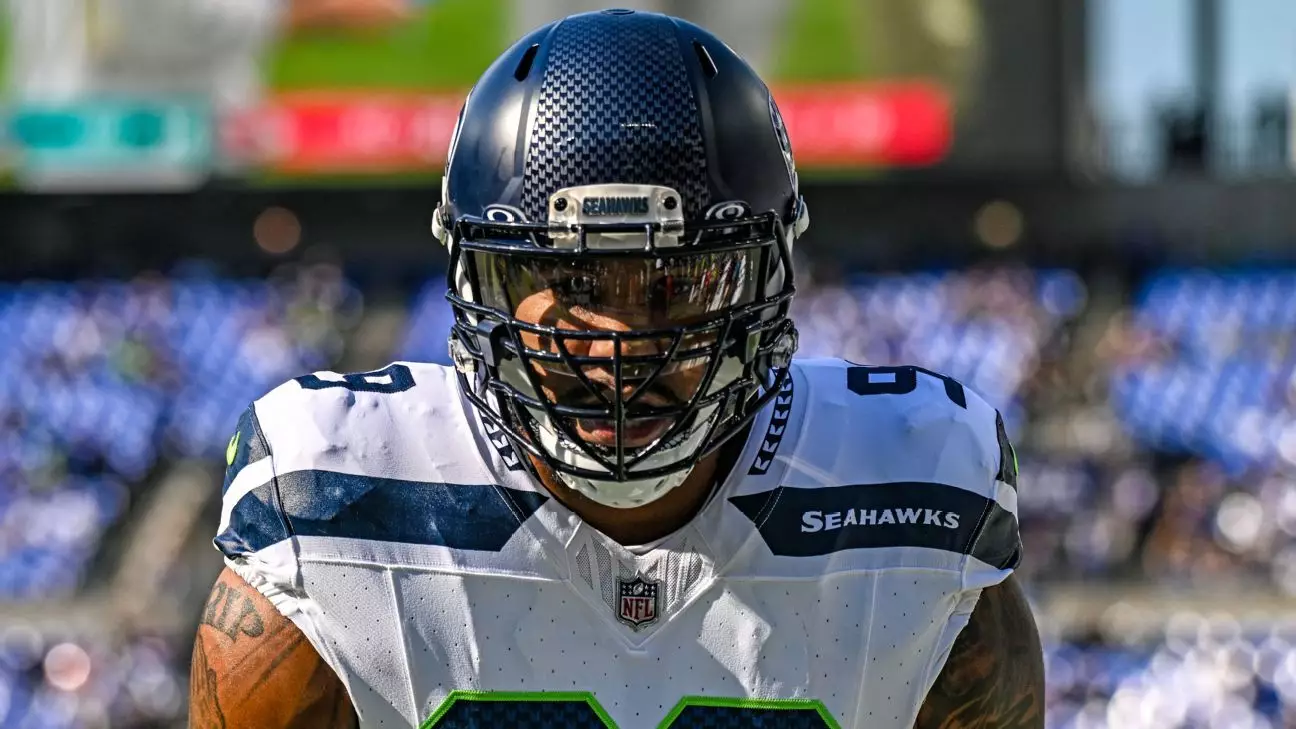In the world of professional football, the Pro Bowl represents a celebration of individual talent amidst the chaos of team dynamics and competition. However, this year’s selections revealed a mix of elation and disappointment, underscoring the complexities behind who garners recognition and who is left in the shadows despite stellar performances. The case of the Seattle Seahawks paints a vivid picture of this reality, highlighting the juxtaposition of Devon Witherspoon’s second consecutive selection and Leonard Williams’ heartfelt frustration over his exclusion.
Devon Witherspoon’s ascendance to Pro Bowl status is a remarkable achievement for the young cornerback. Securing a second straight nod as one of the standout performers for the Seahawks, Witherspoon has showcased his skills and tenacity on the field. Even without boasting impressive individual statistics—having no interceptions and one sack this season—his ability to impact the game cannot be dismissed. His consistent performance and contributions to his team’s defense earned him the respect of voters, solidifying his place in an elite circle after only two seasons. His achievement also reflects a trend in the Pro Bowl voting, where players who may not have overwhelming statistics but possess undeniable talent and an ability to impact games—like Witherspoon—often receive the nod over traditional metrics.
Contrasting Witherspoon’s fortune is the frustrations felt by Leonard Williams, a veteran defensive tackle whose absence from the Pro Bowl roster raises eyebrows. Williams, despite a production-heavy season featuring a career-high 9.0 sacks and a record-setting interception return for a touchdown, found himself overlooked in favor of other defensive linemen. This oversight not only reflects a potential bias amongst voters but also emphasizes the inconsistencies within the Pro Bowl selection process itself. Williams’ palpable disappointment resonates not just because of the accolade but because of what it signifies in terms of legacy and recognition in an increasingly competitive league.
The crux of Williams’ discontent lies in the apparent disjunction between performance and recognition. He recorded significant achievements throughout the season, yet his accolades were not enough to compensate for the subjective nature of the voting system that evaluates Pro Bowl candidates. His assessment that some players in the league receive more favorable recognition compared to others adds an additional layer to the discussion surrounding how players are evaluated and honored for their contributions.
When looking at the statistics, a deeper dive into the numbers reveals just how Williams outperformed those who made the Pro Bowl cut. His achievements, including 15 tackles for loss and 26 quarterback hits—leading among NFC interior linemen—elevate his rightful claim for inclusion. Furthermore, unlike his fellow nominees, Williams delivered standout plays that made significant impacts in games, evident in his historical interception return. This raises critical questions about the weight given to individual statistics versus narrative and media perception.
As players strive for recognition, the underlying theme remains: accolades like the Pro Bowl have lasting implications for a player’s legacy, contract negotiations, and overall reputation in the league. For Williams, this realization grows clearer as each season pasees. While he expresses appreciation for those who made the Pro Bowl, a part of him likely grapples with the situation’s unfairness.
Geno Smith, the Seahawks’ quarterback, did not shy away from sharing his thoughts on the matter. His comments reflect a broader sentiment among many NFL players who have faced similar frustrations. The acknowledgment of bias in voting highlights an ongoing conversation about how media markets and fan engagement can influence Pro Bowl selections. The fact that players from bigger markets or those with higher media visibility often appear favored in such decisions speaks to a systemic issue within these honorific systems.
Moreover, Williams’ potential status as an alternate to the Pro Bowl further complicates the narrative. His attitude regarding this prospect reflects a complex relationship with recognition; it does not diminish the frustration of simply being considered a backup selection rather than a primary nominee.
As the NFL evolves, so too should the systems that govern player recognition. The debate surrounding Pro Bowl selections serves as a microcosm of broader discussions about merit, legacy, and the criteria used to determine greatness within the sport. For both Witherspoon and Williams, the experience can be seen as an opportunity for awareness—an opportunity to revisit what it means to be recognized in a sport rife with competition, dedication, and unfathomable talent. Balancing tradition with fairness will be pivotal in shaping the future of player recognition in the NFL, ensuring that talent is acknowledged and celebrated, irrespective of the circumstances.

